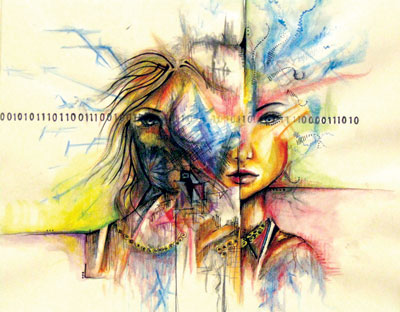All Nonfiction
- Bullying
- Books
- Academic
- Author Interviews
- Celebrity interviews
- College Articles
- College Essays
- Educator of the Year
- Heroes
- Interviews
- Memoir
- Personal Experience
- Sports
- Travel & Culture
All Opinions
- Bullying
- Current Events / Politics
- Discrimination
- Drugs / Alcohol / Smoking
- Entertainment / Celebrities
- Environment
- Love / Relationships
- Movies / Music / TV
- Pop Culture / Trends
- School / College
- Social Issues / Civics
- Spirituality / Religion
- Sports / Hobbies
All Hot Topics
- Bullying
- Community Service
- Environment
- Health
- Letters to the Editor
- Pride & Prejudice
- What Matters
- Back
Summer Guide
- Program Links
- Program Reviews
- Back
College Guide
- College Links
- College Reviews
- College Essays
- College Articles
- Back
The Different Types of Scars
When I was little, scars meant the little indent on your forehead from when you got stitches, or the purplish bruises that showed up after falling on your knees. Of course, some of them still mean that to me; in fact, I have penny-sized bump on my thigh from a hip surgery about a year ago. Scars, in a way, are cool, like an everlasting reminder of the battles you fought. I mean, think of a soldier in the military. They can get gunshot wounds, which turn into scars when healed, or might have to get their leg amputated, which leaves a scar as well.
Those are physical scars.
There are other kinds of scars: emotional. Evidence of psychological trauma engraved in your memory that holds such raw, brutal, and devastating emotions. Plenty of feelings come from time to time – they disappear, but (almost) always return. Emotional scars stay forever; they are captured in boxes that your brain will look into on boring, dreary days – or even during your happiest moments – and can tear you apart. These scars are hidden; they can’t be seen by checking your body or feeling a bump on your forehead. It takes a great doctor to notice them, and a greater doctor to treat them.
Emotional scars can form from abuse, molestation, rape, assault, bullying… the list goes on and on. It’s not as simple as running into a wall or getting hit by a flying baseball. They hurt more. They cause the worst kind of pain. And as you grow older, they haunt you further. They can’t be cured by putting on a prescribed cream or masking it with makeup. Emotional scars take time to heal, if they even can be healed. They have the infamous power to break someone.
A scar, as defined by the Oxford Dictionary, is “a mark left on the skin or within body tissue where a wound, burn, or sore has not healed completely and fibrous connective tissue has developed.” But it also means “a lasting effect of grief, fear, or other emotion left on a person's character by an unpleasant experience.” There are different types of scars; which, especially in our society today, need to be realized, understood, and respected. And as much as one would want to hide certain scars, they make us who we are today: strong, brave, and wise.

Similar Articles
JOIN THE DISCUSSION
This article has 0 comments.
